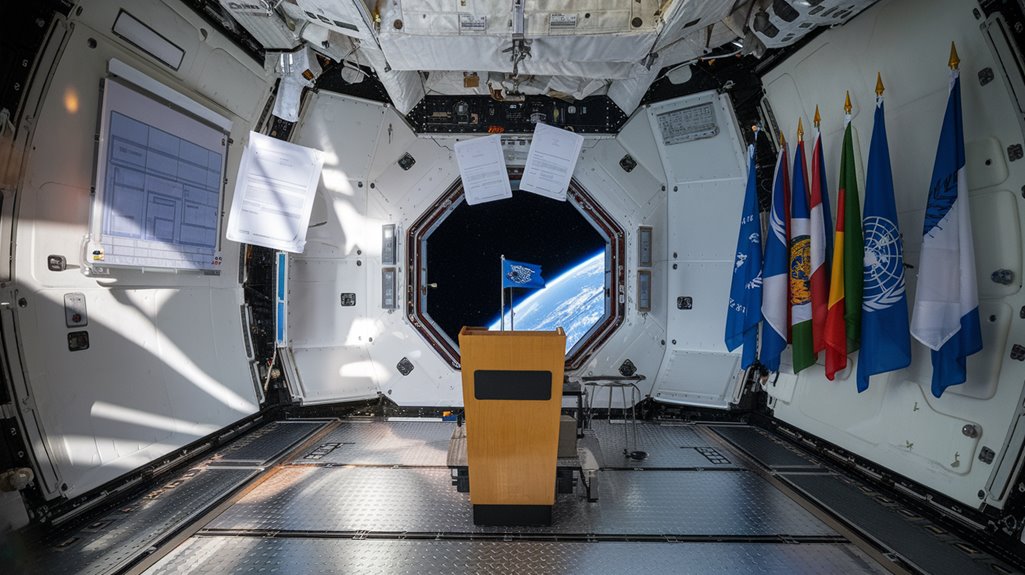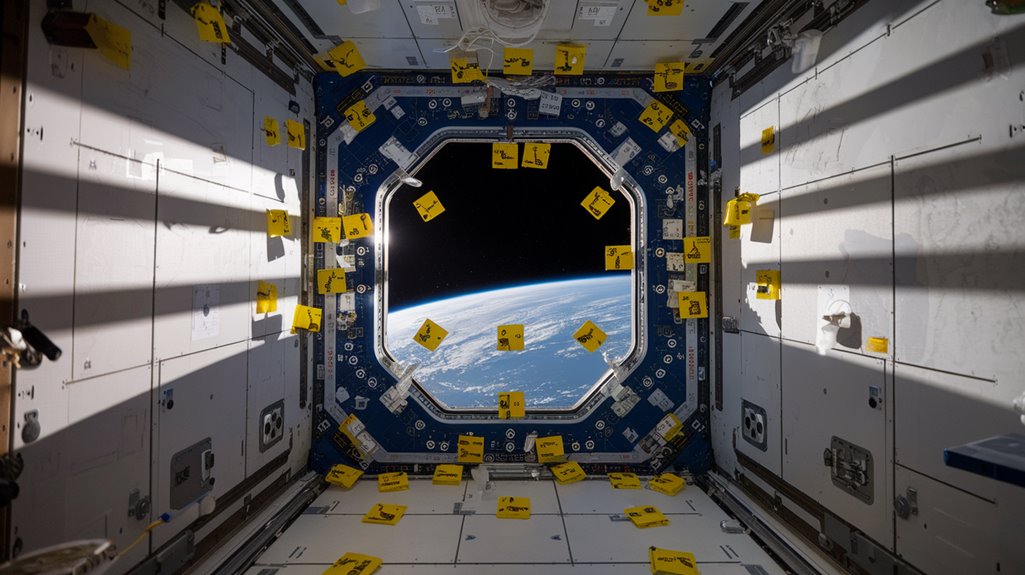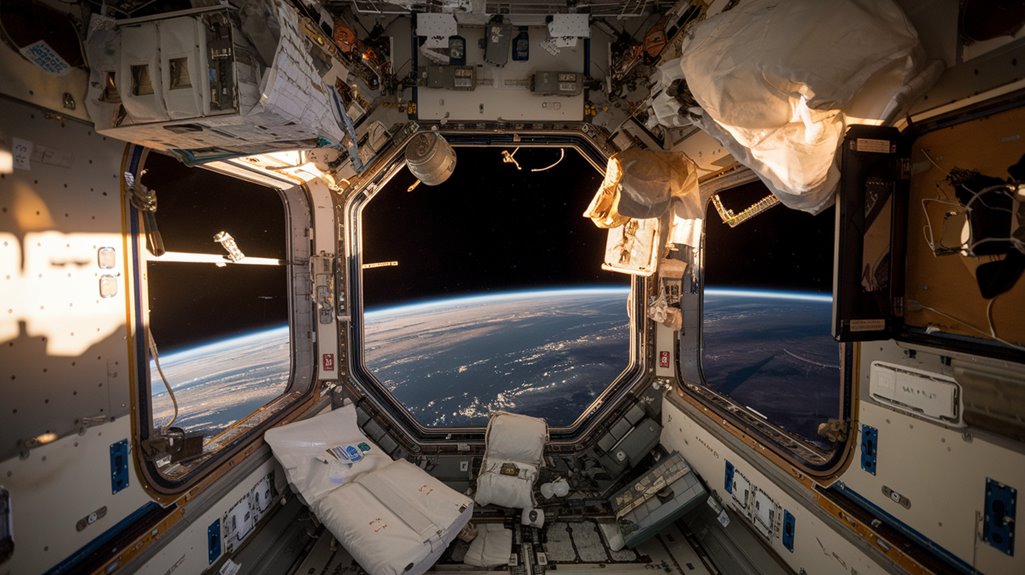Crime in Space? Who Has Jurisdiction Beyond Earth?
You might think crime in space is merely the stuff of science fiction, but it's becoming a real concern as humanity extends its reach beyond Earth. When you're floating 250 miles above any nation's borders, traditional laws get complicated. The International Space Station has already faced its first alleged crime, and with space tourism taking off, you'll want to know who's in charge when things go wrong. Let's explore the fascinating legal frontier of cosmic justice.
The Legal Framework for Crimes Beyond Earth's Atmosphere

As humanity ventures further into space, the legal framework governing crimes beyond Earth's atmosphere has become increasingly complex. The 1967 Outer Space Treaty serves as your primary guide, but it wasn't designed to address modern challenges like space crimes or private commercial activities.
When you're dealing with criminal acts in space, establishing extraterritorial jurisdiction isn't straightforward. You'll find that traditional Earth-based legal principles don't easily translate to an environment where no nation can claim sovereignty. The rising numbers of crew and tourists in space make establishing a comprehensive criminal code increasingly urgent. The continued development of satellite mega-constellations further complicates legal oversight in Earth's orbits.
While the International Space Station has specific jurisdictional rules through its Intergovernmental Agreement, other space locations lack clear legal frameworks. The absence of thorough space resource legislation and crime-specific protocols creates significant gaps.
You're witnessing a legal system that must evolve rapidly to keep pace with humanity's expanding presence in space.
Current Space Crime Jurisdiction: The ISS and Beyond
The International Space Station (ISS) offers the clearest example of how space crime jurisdiction works today. Under intergalactic regulations established by space treaties, you'll find that jurisdiction follows two main principles: the nationality of the alleged offender and the ownership of specific station modules.
If you commit a crime on the ISS, you're subject to the laws of your home country. For instance, if you're an American astronaut who commits an offense, you'll fall under U.S. jurisdiction, regardless of which module you're in. The challenge of investigating these incidents is complicated by the fact that blood spatter patterns behave differently in zero gravity.
However, each partner nation also maintains control over their own modules. This system gets more complex when incidents involve multiple nationalities or occur in shared spaces. If both perpetrator and victim are from the same nation, the case becomes a domestic legal matter.
For future private space stations and Mars missions, we'll need to adapt these rules to address new jurisdictional challenges.
National vs. International Authority in Space
While national governments maintain jurisdiction over their space objects and personnel, international space law creates a complex web of overlapping authorities. The 1967 Outer Space Treaty requires nations to oversee all their space activities, whether conducted by government agencies or private companies, but you'll find this creates unique jurisdictional challenges. This legal framework emerged during the Cold War era, developing separately from traditional aerospace regulations.
Unlike Earth-based scenarios where national sovereignty clearly defines authority, space law operates differently. You can't claim sovereignty over celestial bodies or space itself, but you're responsible for your registered space objects and crew members. The International Space Station has demonstrated successful implementation of state licensing policies for maintaining order among multinational crews.
When multiple nations are involved in space activities, the lines of authority become blurred. This complexity has led to calls for a universal criminal code and better international coordination to address growing space activities and potential crimes beyond Earth's atmosphere.
Private Space Companies and Criminal Liability
Growing involvement of private companies in space activities has introduced new complexities to criminal jurisdiction and liability.
You'll find that traditional legal frameworks aren't equipped to handle crimes committed by private entities in space, where multiple nations might claim jurisdiction over the same incident.
When private liability issues arise, you're facing a web of complications: dual citizenship concerns, cross-jurisdictional operations, and the challenge of determining which country's laws apply. States face international liability for any damages caused by private space activities conducted under their jurisdiction.
While the International Space Station has established protocols for criminal jurisdiction, commercial space vessels operate in murkier legal waters.
You'll notice jurisdiction challenges become even more pronounced with the rise of space tourism and private operators. Current regulations haven't kept pace with these developments, creating gaps that private companies might exploit to avoid legal enforcement. The Outer Space Treaty of 1967 provides the foundational framework for international space law, but it fails to address modern commercial space activities adequately.
The Future of Law Enforcement in Space

As space activities rapidly diversify beyond government missions into commercial ventures and tourism, you'll need to contemplate radically different approaches to law enforcement.
Traditional Earth-based jurisdictional concepts won't suffice in the unique environment of space. The evolution of policing by 2030 will require cross-agency collaboration to effectively monitor and regulate activities beyond Earth.
The future of extraterrestrial law depends on developing specialized frameworks that address emerging challenges. The Outer Space Treaty with 114 nations serves as the foundation for space law today. You'll see space governance evolving through initiatives like the McGill Manual and SpaceLawPedia, which aim to clarify rules for military and commercial activities.
International cooperation is becoming essential, with programs like the CSpO Initiative fostering coordination among spacefaring nations.
As private companies launch more missions and space tourism grows, you can expect new legal mechanisms to emerge.
These will need to balance commercial interests, national security, and the fundamental principle that space remains free from territorial claims.










